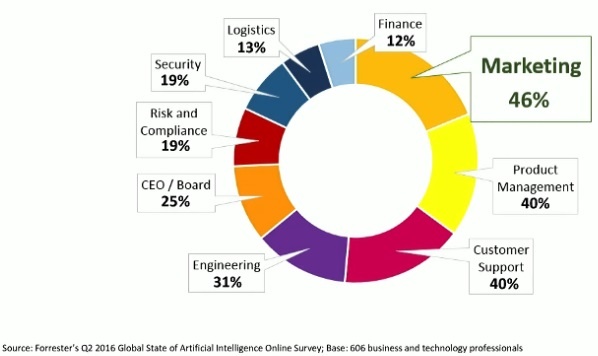
Is this the year we finally see the impact of Artificial Intelligence (AI) on Sales Enablement? We think so, and we aren’t alone.
Whether it’s leveraging a sales assistant to offer human conversation to more leads, allowing salespeople to focus on closing deals or tools to analyze existing customers’ profiles to filter an intelligent set to target customers to pursue, AI is making a major impact on salespeople’s ability to perform.
"For AI to work, it requires three major elements: smarter data models, easy access to unlimited amounts of data, and cheap and powerful cloud computing. Today, these three elements are becoming not only accessible but commonplace."
What Will This Mean for Sales Teams?
- Sales teams will be able to use predictive analysis to prioritize leads
- Digital assistants will help maintain the relationship once it’s established by scheduling calls and issuing reminders
- The AI-driven customer service will automatically recommend the best content at the right time
- Marketing can build predictive journeys for every customer
- IT can embed intelligence, creating smarter apps for employees and customers
*Salesforce.com report, AI for CRM: A Field Guide to Everything You Need to Know
Imagine having to rummage through the wastelands of social media, official websites, search engines and exposed or hidden sources while analyzing patterns to provide incredibly accurate sets of contact information…at superhuman speeds. AI is helping the sales enablement process by gleaming order out of this chaos and allowing the sales organization offer people what they want when they want it. It’s all about the Customer Moments. Implementing strategies that will enable us to win in those customer moments is key to the success of organizations in the year ahead.
"Customers expect that they can get what they want in their immediate context and moments of need."- Rusty Warner, Principal Analyst at Forrester Research
Artificial intelligence is that stage where everyone sort-of knows they’d better get on top of it, but most people don’t really know where to start. Impacting so many aspects of business, marketing appears to be the strongest area of organizations' adoption of AI, at approximately 46%. 
According to Forrester Research’s “Real-Time Interactive Management Report in Q2 2017”, AI turns data into actionable insights that allow a deeper understanding of the massive wealth of information we see each day. Recognition identifies resolution at a personalized, individual level. Context merges history with real-time contextual insight, by offering users the analytics to determine action, context, or message. This orchestration manages the delivery and dialogue at the appropriate touchpoint.
AI will be integrated into the foundation of everything we do for marketing and sales enablement going forward.
Artificial intelligence can allow businesses to get previously unavailable insight into the following questions:
- Are you selling the right product to the right customer at the right time?
- Are you servicing customers on the right channel by the right agent?
- Are you marketing on the right channel at the right time with the best content?
The AI Marketing evolution is occurring in 4 phases.
- Personalization in Digital Media. Using platforms such as HubSpot, this phase finds patterns using data more quickly. "Smart Content", or personalized content is delivered to customer specifically tailored to where a prospect is in the buying process. HubSpot allows you to target content based on anything you know about your contacts. Data shows personalized content dramatically improves engagement of our visitors, seeing targeted Calls-to-Action performing 42% better than generic messaging.
- Insights Detection. Here we see suggestions being made that marketers review and choose to act on. Implementing AI tools to automate the initial lead contact and qualification process, tools like Conversica uses a human-like Sales Assistant to free up even more time for salespeople to focus on higher qualified leads. Added benefits of leveraging AI at this level is the deeper insight given to Sales Managers and ensuring every lead is followed regardless of what stage it may be.
- Dynamic Content. Decisions are made and executed within guardrails and thresholds. This takes Personalization to another level. Using real-time custom and predictive recommendations, perfectly written content will resonate with your targeted audience every time. Applications like Atomic Reach, use AI to make decisions on What, Where, and When to publish content.
- Marketing Automation. Here we see fully autonomous marketing across the marketing mix with control of spending. Putting it all together, systems like Seventh Sense combine data collection, data analysis with predictive engines, and integrate it back into the daily work. For instance, by sending emails that leverage the highest probability of the recipient seeing and responding to it helps increase sales velocity. In sales - Timing is everything!
"No doubt, artificial intelligence is gaining a stronger foothold in the sales stream. Sales enablement leaders need to closely examine this growing trend and consider how they can use it as a tool to develop their sales talent."- Ryann Ellis: Is AI the Future of Sales Enablement?
For the people and correlating processes within an organization, AI will affect the talent, skills, structure, culture, and even collaborative aspects of automation and data integration. When both are merged, organizations will become more transparent, quicker, agile, and able to repeat success. This means successful activities are replicated while casting aside anything that isn’t working.
When done right, Sales Enablement and AI will make organizations more efficient by making them smarter and quicker. As the organization matures it begins to optimize the customer’s journey through engagement with the brand – meeting the rising expectations of customers.

